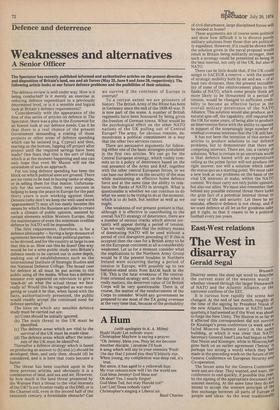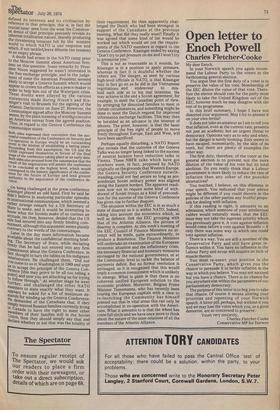East-West relations
The West in disarray
Gerald Segal
Brussels Disarray seems the most apt word to describe the current state of the western world — whether viewed through the larger framework of NATO and the Atlantic Alliance, or the narrower confines of the EEC.
It is curious how rapidly the scene has changed. At the end of last month, roughly at the time of the signing by President Nixon of the new Atlantic Declaration at NATO headquarters, it had seemed as if the West was about to forge the New Unity. The illusion in so far as it affected this correspondent did not survive Dr Kissinger's press conference (a week and 3 failed Moscow Summit later) in the same building, at which it was clear that NATO Secretary General Josef Luns had begun to fear that Nixon and Kissinger, while in Moscow,had gone back on an earlier agreement ('betray' perhaps too strong a word) which they had made in the preceding week on the future of the Geneva Conference on European Security ar10 Co-operation. The Soviet aims for the Geneva Conference were and are clear. They wanted, and want, the conference to end quickly, if possible this year by the signing of the appropriate document at a summit meeting. At the same time they do n°t intend to accept the western principle of the, free exchange between all parts of Europe 0,,,1 people and ideas. As the west traditionaliY
defined its interests and its civilisation by reference to that principle, this is, in fact the crucial issue: seen from the west the Communist denial of that principle precisely reveals its inherent totalitarian nature, thereby producing the threatening tensions felt by the western world to which NATO is one response and which, if not tackled,leave detente (no tension) as an empty phrase. A doubt had arisen in the NATO camp prior to the Moscow Summit about American firmness on this question. Some remarks by President Nixon suggested he wasn't interested in the free exchange principle, and in the judgement of some the American President seemed likely to accept a Geneva Summit which would appear to crown his efforts as a peace-maker in order to help him out of the Watergate crisis. These doubts were allayed by the various statements made during Nixon's and Kissinger's visit to Brussels for the signing of the Atlantic Declaration on June 27. However, the Communique signed after the Moscow Summit seems, by the plain meaning of words,to involve an American retreat from the agreed position. Thus, in regard to the Geneva Conference the communique states:
Both sides expressed their conviction that the successful completion of the Conference on Security and Co-operation in Europe would be an outstanding event in the interest of establishing a lasting peace. Proceeding from this assumption, the US and the USSR expressed themselves in favour of the final stage of the conference taking place at an early date. Both sides also proceed from the assumption that the result of the negotiations will permit the conference to be concluded at the highest level, which would correspond to the historic significance of the conference for the future of Europe and lend greater
authority to the importance of the conference decision.
KOn being challenged at the press conference issinger played an odd hand. First he said he didn't believe in analysing particular episodes In international communiques, which seemed a rather strange remark for a US Secretary of State to make, and it would be interesting to know what the Soviets make of so curious an attitude. He then, however, denied that the US side had entered into any firmly binding commitment, although this statement seems plainly Contrary to the words of the communique.
Later in the day more information became available about the confidential morning brief
g. The Secretary of State, while declaring "rmly that he had not entered into any firm cornmitment about the Geneva Conference, in !act thought to turn the tables on his indignant interlocutors. He challenged them, "Did not YOU come to us in Washington in 1969 and urge us to accept the principle of the Geneva Conference [this may prove to be all too telling a Point] and now you are attacking us for trying to follow through." At another stage he went further, and challenged the other NATO members to state exactly what they want. It aPPears he asked for a list of minimum deMands for winding up the Geneva Conference. fie demanded of the Canadians that, if they simply wanted Russian families currently living in Canada to have the right to meet other members of their families still in the Soviet Union, then they should simply say that and declare whether or not that was the totality of
their requirement. He then apparently challenged the Dutch who had been strongest in support of the Canadians at the previous meeting. What did they really want? Finally it was agreed that some kind of list would be worked out which would set out the require ments of the NATO members in regard to the Geneva Conference. Kissinger ended by saying "Don't try to put pressure on me and I won't try to pressurise you." This is not as reasonable as it sounds, for Kissinger is in a position to apply pressure, whereas in fact it is doubtful whether the others are. The danger, as seen by various high-level officials in NATO, is that Kissinger may in fact go on as he did in the Vietnamese negotiations and endeavour to mis lead each side as to his real intention. He may achieve in the end a Soviet agreement, for example, to meet the Canadian point of View, by arranging for disunited families to meet in certain circumstances, and something might be done to meet the Dutch request for improved information exchange facilities. This may then be heralded as an advance in the interest of détente. The point, however, is that the basic principle of the free right of people to move freely throughout Europe, East and West, will have been sacrificed.
Perhaps equally disturbing, a NATO Report also reveals that the outcome of the Geneva Talks was no longer being linked to the success of neutral balance force reduction talks in Vienna. These NBFR talks which have got nowhere were, in fact, proposed by NATO originally on the grounds that Western Europe, the Geneva Security Conference notwith standing, could not feel secure so long as pre ponderant Soviet military power was aligned along the Eastern borders. The apparent readi ness now not to require some kind of withdrawal of Soviet troops as a kind of precondition for the success of the Geneva Conference has given rise to further disquiet. The situation within the EEC is in as much a state of disarray as it is within NATO. Indeed, taking into account the economics which, as well as defence, link the EEC grouping with that of the Atlantic Alliance, the picture of disarray is complete. At this week's meeting of the EEC Council of Finance Ministers no attempt will be made, quite extraordinarily, to produce a Resolution. The Finance Ministers will undertake an examination of the European economic situation and the inflationary crisis, the necessary financial and monetary measures envisaged by the national governments, or at the Community level to tackle the balance of payments deficit. But no formal resolution is envisaged, as it is recognised that this would imply a common commitment which is unlikely to emerge. What is plain is that there is no coherent unified European solution to the economic problem. Moreover, Belgian Prime Minister Tin nemanns, who has recently been touring the European capitals with a view to re-launching the Community has himself pointed out that in vital areas this can only be accomplished in co-operation with the Americans. What it amounts to is that the wheel has come full circle and we have once more to think about the nature of the inter-relations of all the members of the Atlantic Alliance.



































 Previous page
Previous page